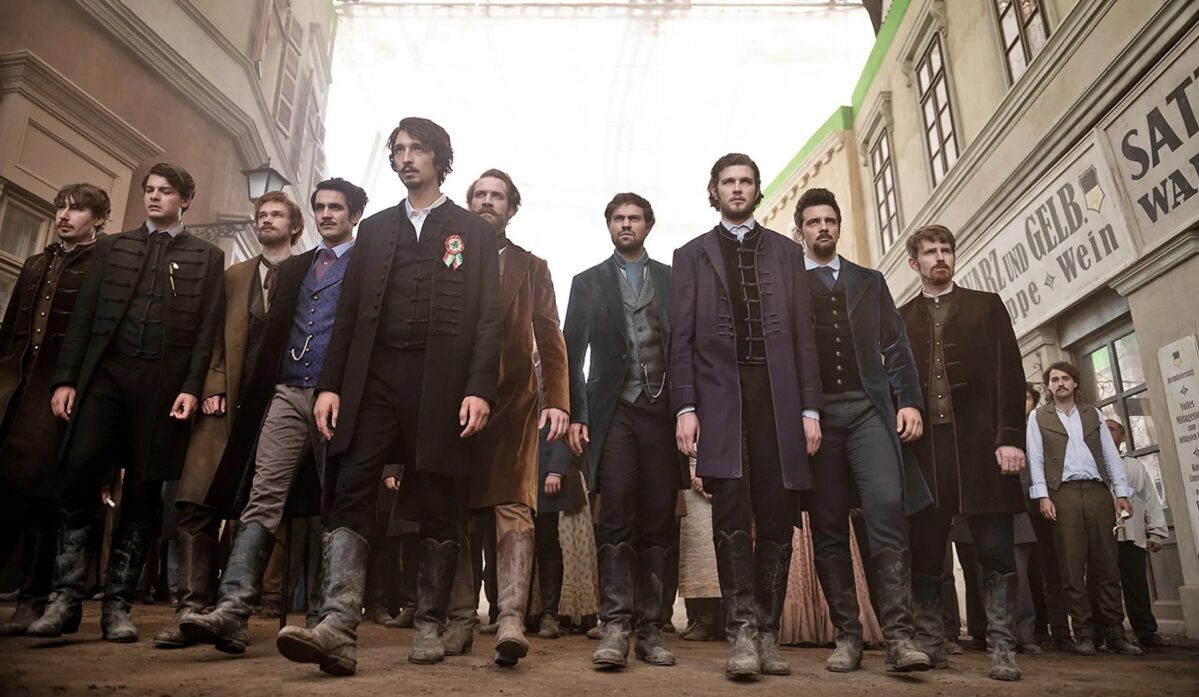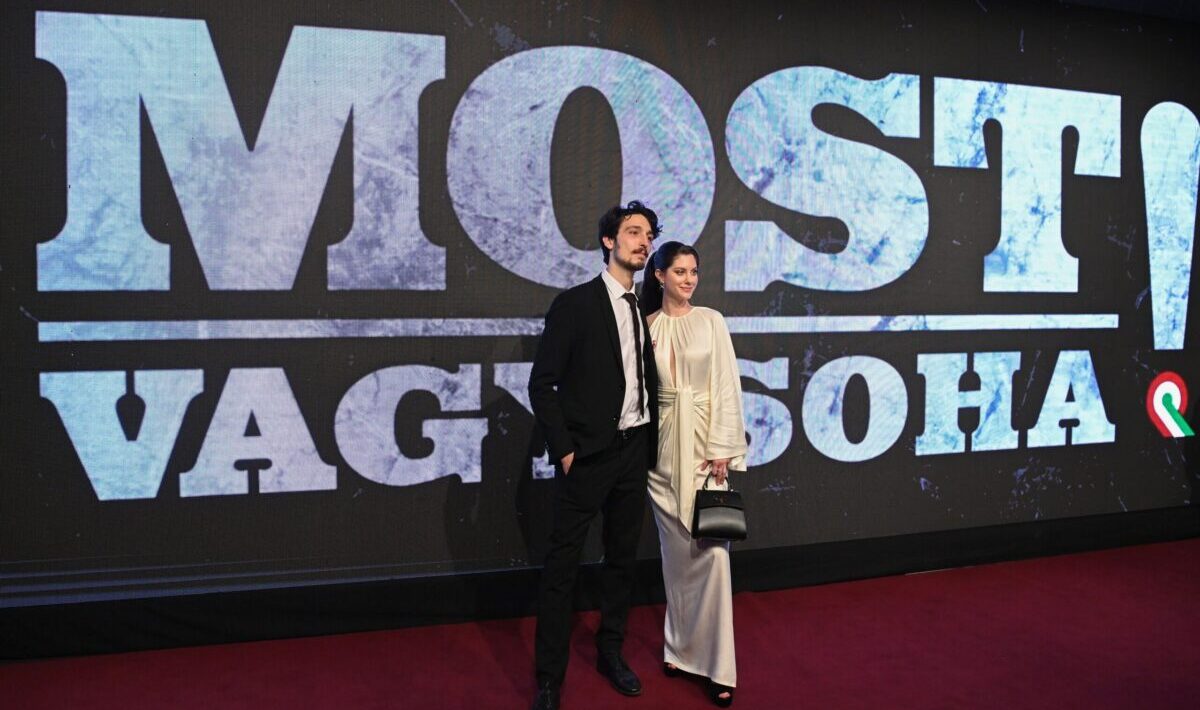There is no other language in this world where such an expression exists - "explains". You can't speak French or English or German.
We are doing the right thing if we start writing our film review by wondering what kind of work would have been liked by the other side of the political palette, who, as we know, have accumulated good taste, knowledge, talent, and craftsmanship for decades - see Mi kis falunk, RTL -, thus, they guide everyone in matters of art, culture and profession with complete confidence, and they are never wrong.
So: what kind of film would you like to see over there, on the other side of the liberal-Jacobin Styx, about March 15, 1848? We have no idea.
Because - unlike them - we don't know, and that's why we don't even tell them what and how they should want, love, imagine and realize in high, medium and low culture, just as we will never know what it's like to live as a liberal-Jacobin On the other side of the Styx, where, among other things, the world-saving mass murderers always live.
What movie would you like?
We have no idea what kind of movie they wanted. However, we know what are the "brave", "innovative", "refuting clichés", "breaking out of habit and tradition", "looking for new paths" artistic (sorry, I forgot: "artistic") solutions that were certainly celebrated, but at least they would have welcomed me.
Let's outline some of them!
1.: Sándor Petőfi was revealed to be a homosexual on March 15, 1848. Gyöngéd has emotional ties to Jókai, he only married Júlia Szendrey because he did not dare to go against the strict conventions of the time, but the storm of the revolution sweeps away the conventions, the two young people stand hand in hand on the steps of the National Museum, after a hot and revolutionary kiss recite the National Anthem, the crowd enthusiastically welcomes all this, only an evil Hungarian would grumble to himself that he did not come here for this, but for his country, critics would immediately know that this character was Viktor Orbán, and Júlia Szendrey would accept the coming out, because he could finally connect his life with his true love, Róza Laborfalvi.
2.: The entire film would look at March 15 from the Habsburg point of view and the Hungarians, who are unwashed, smelly, nationalist, stupid, it would be revealed thanks to the Habsburg protagonists that "the Hungarian is genetically inferior, […] the Hungarian is not even responsible for the most serious historical crimes he feels a twinge of remorse that he blames everything on someone else, that he always points the finger at someone else, that he wallows happily in the puddle of the dictatorship, laughs and eats the laundry, and doesn't want to know that he will be stabbed, that he can neither study nor work and he doesn't want to, but to envy and, if he has the means, to kill those who lead him to something with work, study, and innovation."
3.: The entire film focuses on the terrible anti-Semitism of the revolution and freedom struggle of 1848-49, exaggerates and shows that all of this came to the surface already on March 15, in fact, this was actually the driving force of the revolution, at the end of the film Petőfi evokes it in a fever dream-like vision the holocaust.
Roughly, these are the concepts that would not have aroused resentment in them, and they would not have thought of calling historical loyalty to account.
But unfortunately, Now or Never! remained in debt for all this. The Rákays made a kind of "down-to-earth", "traditional", Hungarian "nationalist" film, and thus "historical fidelity" can immediately be held accountable.

Source: player.hu
There is no good Robespierre or Samuel character
Which is wrong. But in what? More precisely: what is being held accountable for in the film?
Let's see some examples!
1.: Petőfi was not like that.
That's for sure.
Already at the dawn of the regime change, I was lucky enough to write in an editorial on March 15 (of course! In 168 Órá!) that I am a fan of János vítez, the National song or even Petőfije at the end of September, while the Akassáts raise the kings! I am terrified of Petőfije.
Sándor Petőfi - like the vast majority of the greatest geniuses - could have been an unbearable figure in real life. A sense of prophethood and chosenness combined with a huge ego, conflict of interests, and a true, unadulterated, extreme Jacobin spirit, ruthlessness and bloodlust - such was he.
"A knife in Lamberg's heart, a rope around Latour's neck / And maybe more will come after you, / You are finally becoming powerful, people! / This is both very good and really beautiful, / But you haven’t done much with this yet – / Hang the kings!”
Jesus Maria…
Anyway, I have to note that at the time, at the dawn of the regime change, they were fans of my journalism because they saw in it the "failure" of the revolution, i.e. the non-punishment and non-accountability of the criminals of the Kádár regime (even Gábor Péter breathed his damn soul in bed, between the pillows in 1993 in!), which is only interesting because their descendants, this present-day "over there", on the other side of the liberal-Jacobin Styx, would like to be hanged...
So Petőfi was not like that.
But let's face it, it's very difficult to dream of a lovable and likable Robespierre, Danton or Marat or Tibor Szamuely on the screen, while this struggling, a little insecure at times, but relentlessly loyal to the Hungarian cause, Petőfi, who appears in this film, is certainly lovable. .
At least I loved it. And when he recites the National Anthem for the first time in the morning, in Pilvax, so uncertainly, my eyes certainly got teary.
The Now or Never! historical fidelity
And even then, let's stop for a moment - if it's historical loyalty.
On the morning of March 15, 1848, Petőfi, Jókai, Vasvári, Bulyovszky read the twelve points in Pilvax, and Petőfi recited the National Anthem for the first time then and there.
Then the Petőfiés from Pilvax - yes, in the pouring rain - set off for the universities to mobilize the student body. Their first journey led to the faculty of medicine, from there they went to the student body of the polytechnic together with the medical students, and finally to the lawyers. The Twelve Points were read at each location, Petőfi recited the National Anthem at each location, and by this time the crowd had grown to around two thousand. This enthusiastic crowd of 2,000 then marched to the Landerer and Heckenast printing house on the corner of Hatvani (today Kossuth Lajos) and Szép utca, where they seized the printing presses in the name of the people and printed the National Anthem and the Twelve Points, which Irinyi distributed to the crowd around noon. .
And then let's continue!
"The success gave courage to the initiators, who held a rally at the National Museum at three in the afternoon, and then the crowd, which had swelled to ten thousand in the meantime, marched to the Pest city council and persuaded the members of the council to join their demands. A revolutionary caucus was formed, then the people went to Buda, to the Governor's Council. The caucus leaders, Pál Nyári, Deputy Mayor of Pest County, Lipót Rottenbiller, Deputy Mayor of Pest and Gábor Klauzál, Ambassador of Csongrád County, who arrived accompanied by a huge crowd, presented the demands. The Governor's Council, intimidated by the crowd, accepted the Twelve Points, immediately abolished censorship, and released from prison Mihály Táncsics, who was convicted in 1847 on charges of press offense and sedition, and who was taken to Pest by the crowd in a triumphal procession. In the evening, the victory of the revolution was celebrated in the National Theater with a gala performance by Bánk bán.
The fact is, ladies and gentlemen, that Now or Never! adheres almost rigorously to this sequence of events.
In comparison, I read a "criticism" in which the author thought of the peace march about the crowd marching from Pest on the boat bridge to Buda (course film, course film!), although, well, my father always said that being stupid is the easiest thing.
2.: Júlia Szendrey was not like that either.
Almost certainly not. However, in 1860 he wrote this poem:
Hungarian children's song
Although I am a child, I still know very well / What is the most sacred on earth, / And that this holiness must be depended on, / Like a child on its mother's bosom. That's how I look down on you, that's how I love you, / My Hungarian country, my dear Hungarian country! / I proudly admit that I am your son, / And I bless fate that you are my mother! / And if one day my wings will grow, / And I can work with reason and strength, / Let all my actions be a sacrifice / On your altar, what I bring for your benefit. / As long as a spark of reason burns / In my head, like the firefly of the night, / May it burn for my country, on the altar stool, / A humble candle beam that keeps vigil. / And as long as my two arms prevail, / – Like the crumbs of a poor ant – / I carry stone by stone and raise / the beautiful walls of your cathedral. / And you will live, my country, so you will live / Hey, your children care for you, / Who, like their fathers, are ready for your good / With joy to give blood and life!
I would like to quietly note that today, over there, on the other side of the liberal-Jacobin Styx, they are sick of this.
And then allow me to confess: Júlia Szendrey fighting with the Austrian secret police was a little too much for me too, but she was probably included in the film not for my sake, but for the sake of the young people and to increase the excitement. And it in no way led me to root for the secret police. As I also note, the secret policeman as an "adventure movie element" did not bother me at all, not to mention that the character played by Ottó Lajos Horváth is simply brilliant.
3.: The film "explains itself".
I wouldn't waste too much time on that. I will only note this quietly and modestly, there is no other language in this world where such an expression exists. You can't speak French or English or German. It is another matter that the nations of the West are busy denying themselves today.
The big question is, should we follow their example? Let me correct you: this is not a big question. Quite a small question. And since they say yes on the other side of the liberal-Jacobin Styx, we can be quite sure that they don't.

Nándor Berettyán, who plays Petőfit and Sára Mosolygó, who plays Júlia Szendrey in Now or never! in the historical adventure film before the premiere of the work in Budapest, at the Cinema City Arena on March 13, 2024. The film about March 15 and its hero, Sándor Petőfi, was shown in the presence of the creators, which can be seen in cinemas nationwide from March 14. MTI/Zoltán Máthé
Those who cannot and must not be met
At that time, the traditional big movie and the new wavy big movie, that is, Sons of a Stone-hearted Man and Poor Guys, were made almost at the same time.
We can read this in Filmvilág:
"The Hungarian new wave of the 1960s was hit by a specific kind of 'positive discrimination': criticism and, as a result, the canon of film history focused its attention exclusively on new wave authors, the modernist style. Rightly so, of course, since great values and innovative forms were born here. But at that time there was (still) another, entertaining, popular strand of Hungarian film production, which critics not only paid little attention to - this is still an understandable attitude in an era that resulted in the revolutionary renewal of cinematography - but were largely viewed with distaste. The unbalanced situation was redressed by the audience, who loved and watched the films for them en masse. There were obviously good and bad works on both sides, but their juxtaposition and unilateral appreciation and devaluing definitely led to a loss of proportion. However, in terms of proportions, the sixties showed an unprecedented balance in terms of popular and high film culture. The year 1965, the zenith of the new wave, can even be considered symbolic, as it produced a pair of films related in theme and made in the same studio: The Poor Man and Sons of a Stone-Hearted Man. […]
If not the entire corpus of popular films of the sixties, we can definitely say that Sons of the Stone-Hearted Man is a worthy alternative to the new wave. Várkonyi adapts one of the best pieces of Jókai's huge oeuvre with a sure hand, mastering the genre rules of the historical adventure film. The richly presented interior and exterior shots follow each other in a snappy rhythm, but each scene has its own dramaturgy, from the opening »theme« to the inserted gags to the dramatic conclusion. The action scenes are spectacular, the pictures by István Hildebrand, the sets, the costumes – especially thanks to the digitally restored image – are eye-catching, and the acting of the actors is expressive. According to the rules of the genre, the historical events of the 1848-49 revolution and war of independence are written into a romantic family story, but neither the picture of history nor the family history is idealized: the film also formulates a critique of the Hungarian mentality that replaces military leadership and rationality with ambition; and in the final image, we see the mother falling on her bloody vest hit by the bullet of the youngest son who sacrificed his life instead of his brother. There is no happy ending; the era was romantic, neither Jókai's novel nor Várkonyi's film version denies this, but the historical reality is not, and the expression of this is not lacking in Sons of a Stone-Hearted Man." (Filmvilág magazine 2017/10, pp. 61-62)
The audience and posterity will decide and judge
Compared to 1965, the change is so much that a large-scale, spectacular, entertaining, popular, traditional historical film has now been produced, which, moreover, has an admittedly national sentiment, so that we don't say: it wants to be "Hungarian". The "new wave", on the other hand, did not produce any Poor Boys, but nothing. And let there be no doubt: if Sons of a Stone-Hearted Man had been made not Now or Never!, it would have received exactly the same criticism from there.
But the audience and posterity will decide and judge. And that's all that matters.
Now and always.
And the opinions of those living on the other side of the liberal-Jacobin Styx are completely uninteresting.
Featured image: Zsolt Bayer on April 27, 2022. Photo: Tamás Kaszás / Index













